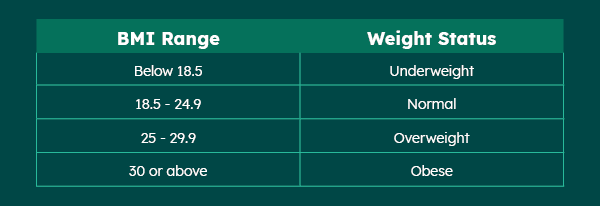Talking to Children About Weight
Talking to children about weight can be difficult. You and your co-parent should be on the same page when it comes to creating healthy habits in each family unit.
- 4 min read
- health & wellness

Millions of children struggle with being overweight or underweight. Talking to your kids about nutrition and exercise can be uncomfortable, but it is important to help them understand and adhere to healthy eating and exercise habits. There are several ways you can build healthy habits as a family, without making your child feel bad.
You and your co-parent should strive to follow the same guidelines when it comes to eating habits and exercise routines for your children
It is beneficial for co-parents to plan meals with the same nutritional guidelines in place so that both households are on the same page when it comes to dietary needs, restrictions, and expectations.
Any additional caregivers (siblings, grandparents, nannies, etc.) should also be aware of these guidelines as your child switches between homes. This will help both family units avoid any potential dietary issues, as well as keep consistency with your child’s eating habits.
Co-parents should discuss their child’s weight in relation to their health
Your pediatrician can help you determine whether your child is overweight or underweight by looking at their body mass index (BMI):

There are limitations to this, which your pediatrician will discuss with you and your child. Body structure and muscle build can throw off the accuracy of an individual’s BMI.
TalkingParents can help you and your co-parent share information like this all in one, secure place. We offer Secure Messaging for co-parents, as well as the Info Library, which facilitates safe information sharing.
The obesity epidemic is increasing dramatically in children
The official parenting website of the American Academy of Pediatrics (AAP) says one in five kindergarteners today is already carrying excess weight. The AAP parenting website lists these 12 tips for families to help children make healthy eating habits:
- Shop smarter. Rising costs of food makes creating health meals a challenge. The AAP recommends using online resources from the USDA to cost-effectively shop for healthy foods.
- Make healthy food easily accessible. Water pitchers, fruits, vegetable snacks, and other low-calorie snacks should be readily available at all times and placed in plain sight; for example, in front of the refrigerator or in large bowls on the kitchen counter or table. Replace the cookie jar with a fruit bowl.
- Watch portion sizes. They have increased dramatically over the past few years. Use a smaller sized serving spoon and smaller plates help children take appropriate servings of higher calorie foods. When you go out to eat as a family, recognize the portion sizes and discuss eating half and taking the other half home to enjoy later.
- Eat breakfast. Skipping meals, especially breakfast, has been associated with obesity. Since mornings can be time-constrained, look for healthy on-the-go breakfast options.
- Cook with your kids. Children take pride in being helpers, so let them mix the bowl or add ingredients to what you are making, and they’ll be more likely to eat what they helped create.
- Count the colors. The more colors on their plate the healthier, so make it a game or competition and have them count how many colors are on their plates. (e.g., two green vegetables, one orange, one yellow…)
- Give your children the chance to make some decisions, when applicable, on what they will be eating for dinner. (e.g., Would you like green beans or peas for dinner tonight?)
- Limit treats and snacks. Children should have 3 well balanced meals and 1-2 small snacks over the course of the day. Do not let your children graze all day; they need structure to help limit the snacking. Treats are just that, treats on special occasions like birthdays and holidays. They should not be a daily part of your child’s diet.
- Limit the juice to 4 ounces or less a day and avoid sugar-sweetened drinks like soda and energy drinks.
- Avoid using food as a reward (i.e., celebrating with ice cream, going out to eat) or a punishment (restricting food for bad behavior).
- Don’t eat directly from the package. High-calorie snacks should be repackaged at home in smaller bags or containers.
- Turn the TV off for dinner. Studies have shown that people consume more food when watching TV than those who do not. Take that time to reconnect with your family at dinner.
Again, it is important for you and your co-parent to adhere to the same, or similar, guidelines. Consider discussing this list with your co-parent to help keep both households on the same page.

If you are worried your child might be underweight, they may not be eating enough foods with key nutrients
This can cause malnutrition. Over time, malnutrition can affect a child’s health in several ways. An article by Healthline says symptoms may include feeling tired or drained, getting sick often, experiencing hair thinning or loss, dry skin, teeth issues, or skipped periods in females.
If you or your co-parent notice these symptoms consistently, you should keep track of and share this information between households.
If your child is severely underweight or malnourished, they can face serious or life-threatening health complications. You should contact your pediatrician immediately to make a specialized plan for your child.
Healthy exercise habits are as important as healthy eating habits
The American Academy of Pediatrics recommends that infants, children, teens, and children with special needs have time for physical activity each day. The AAP outlines these guidelines:
- Infants need at least 30 minutes of “tummy time” and other interactive play, spread throughout each day.
- Kids aged 3-5 need at least 3 hours of physical activity per day, or about 15 minutes every hour they are awake.
- Kids 6 years and older need 60 minutes of moderate to vigorous physical activity on most days of the week.
You and your co-parent should work to implement similar exercise plans for your kids. Keeping your child active between households will make it easier for both parents to maintain healthy habits without pressure.